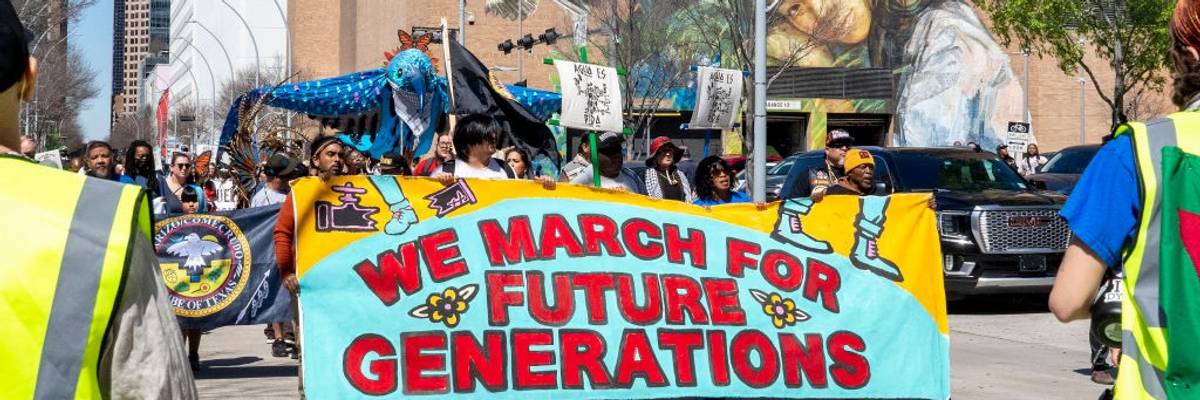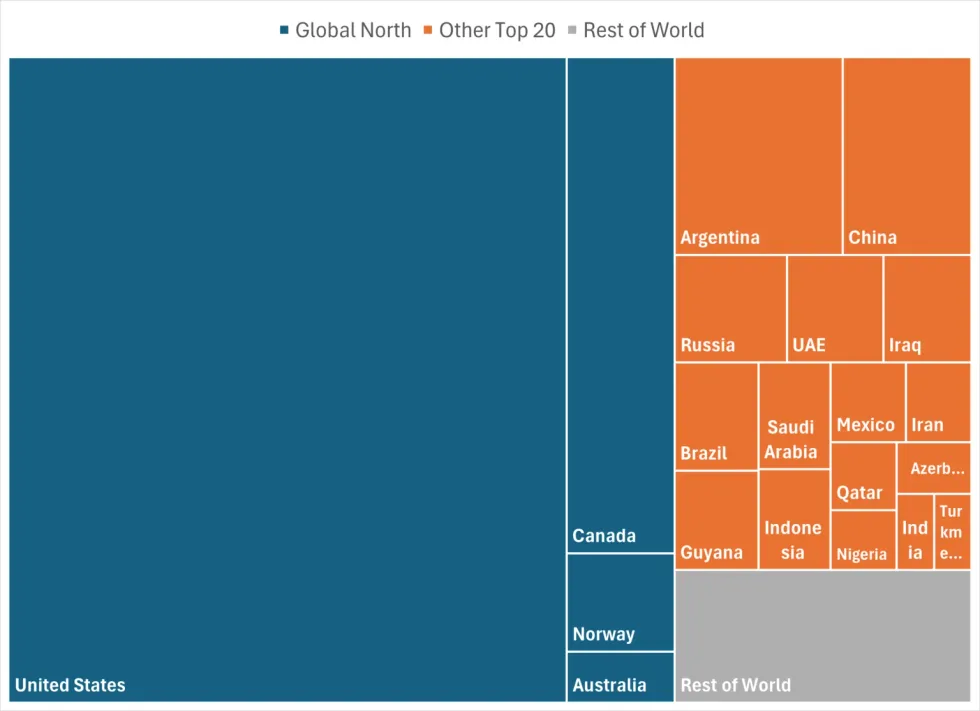

SUBSCRIBE TO OUR FREE NEWSLETTER
Daily news & progressive opinion—funded by the people, not the corporations—delivered straight to your inbox.
5
#000000
#FFFFFF
To donate by check, phone, or other method, see our More Ways to Give page.


Daily news & progressive opinion—funded by the people, not the corporations—delivered straight to your inbox.

Climate defenders march in Houston on March 10, 2025.
"This is not just hypocrisy," said one climate campaigner. "It is a death sentence for communities on the frontlines of the climate crisis."
Four wealthy nations—the United States, Canada, Norway, and Australia—account for the majority of planned oil and gas expansion over the next decade, according to new data published by Oil Change International on Monday, the first day of the Bonn Climate Change Conference in Germany.
Oil Change's analysis, titled Planet Wreckers, notes that if those four Global North nations stopped their planned new oil and gas extraction, 32 billion tons of carbon pollution would stay in the ground instead of being burned and released into the atmosphere, where they fuel planetary heating. That's the equivalent of three times the annual global emissions created by burning coal.
"A handful of the world's richest nations remain intent on leading us into disaster. This is not just hypocrisy. It is a death sentence for communities on the frontlines of the climate crisis," Oil Change International global policy lead Romain Ioualalen said in a statement Monday.
"It is sickening that countries with the highest incomes and outsized historical responsibility for causing the climate crisis are planning massive oil and gas expansion with no regard for the lives and livelihoods at stake," Ioualalen added.

Nations that took part in the 2023 United Nations Climate Change Conference, or COP28, in Dubai committed to an equitable transition from fossil fuels. However, as Ioualalen noted, "this commitment is largely being ignored by some of the world's richest countries."
"Equity is not a buzzword. It is a foundational requirement to accelerate the transition," he asserted. "Until the richest countries commit to ending fossil fuel production and use and deliver adequate climate finance on fair terms, global calls for fossil fuel phaseout will ring hollow to developing countries that are struggling to meet development, energy access, and climate resilience needs."
The prospects of the U.S. making any meaningful near-term contribution to such a transition are dim given the Trump administration's "drill, baby, drill" energy policy.
The new report, and this year's Bonn conference, come between last year's COP29 in Baku, Azerbaijan and the upcoming COP30 in Belém, Brazil. Oil Change noted that Brazil ranks among the 10 largest projected expanders of oil and gas over the next decade, with plans to surpass Saudi Arabia.
"Countries have an opportunity to course correct by working together," Ioualalen stressed. "COP30 must deliver a collective roadmap for equitable phaseout dates for fossil fuel production and use, to actually deliver on commitments all countries made at COP28."
Dear Common Dreams reader, The U.S. is on a fast track to authoritarianism like nothing I've ever seen. Meanwhile, corporate news outlets are utterly capitulating to Trump, twisting their coverage to avoid drawing his ire while lining up to stuff cash in his pockets. That's why I believe that Common Dreams is doing the best and most consequential reporting that we've ever done. Our small but mighty team is a progressive reporting powerhouse, covering the news every day that the corporate media never will. Our mission has always been simple: To inform. To inspire. And to ignite change for the common good. Now here's the key piece that I want all our readers to understand: None of this would be possible without your financial support. That's not just some fundraising cliche. It's the absolute and literal truth. We don't accept corporate advertising and never will. We don't have a paywall because we don't think people should be blocked from critical news based on their ability to pay. Everything we do is funded by the donations of readers like you. Will you donate now to help power the nonprofit, independent reporting of Common Dreams? Thank you for being a vital member of our community. Together, we can keep independent journalism alive when it’s needed most. - Craig Brown, Co-founder |
Four wealthy nations—the United States, Canada, Norway, and Australia—account for the majority of planned oil and gas expansion over the next decade, according to new data published by Oil Change International on Monday, the first day of the Bonn Climate Change Conference in Germany.
Oil Change's analysis, titled Planet Wreckers, notes that if those four Global North nations stopped their planned new oil and gas extraction, 32 billion tons of carbon pollution would stay in the ground instead of being burned and released into the atmosphere, where they fuel planetary heating. That's the equivalent of three times the annual global emissions created by burning coal.
"A handful of the world's richest nations remain intent on leading us into disaster. This is not just hypocrisy. It is a death sentence for communities on the frontlines of the climate crisis," Oil Change International global policy lead Romain Ioualalen said in a statement Monday.
"It is sickening that countries with the highest incomes and outsized historical responsibility for causing the climate crisis are planning massive oil and gas expansion with no regard for the lives and livelihoods at stake," Ioualalen added.

Nations that took part in the 2023 United Nations Climate Change Conference, or COP28, in Dubai committed to an equitable transition from fossil fuels. However, as Ioualalen noted, "this commitment is largely being ignored by some of the world's richest countries."
"Equity is not a buzzword. It is a foundational requirement to accelerate the transition," he asserted. "Until the richest countries commit to ending fossil fuel production and use and deliver adequate climate finance on fair terms, global calls for fossil fuel phaseout will ring hollow to developing countries that are struggling to meet development, energy access, and climate resilience needs."
The prospects of the U.S. making any meaningful near-term contribution to such a transition are dim given the Trump administration's "drill, baby, drill" energy policy.
The new report, and this year's Bonn conference, come between last year's COP29 in Baku, Azerbaijan and the upcoming COP30 in Belém, Brazil. Oil Change noted that Brazil ranks among the 10 largest projected expanders of oil and gas over the next decade, with plans to surpass Saudi Arabia.
"Countries have an opportunity to course correct by working together," Ioualalen stressed. "COP30 must deliver a collective roadmap for equitable phaseout dates for fossil fuel production and use, to actually deliver on commitments all countries made at COP28."
Four wealthy nations—the United States, Canada, Norway, and Australia—account for the majority of planned oil and gas expansion over the next decade, according to new data published by Oil Change International on Monday, the first day of the Bonn Climate Change Conference in Germany.
Oil Change's analysis, titled Planet Wreckers, notes that if those four Global North nations stopped their planned new oil and gas extraction, 32 billion tons of carbon pollution would stay in the ground instead of being burned and released into the atmosphere, where they fuel planetary heating. That's the equivalent of three times the annual global emissions created by burning coal.
"A handful of the world's richest nations remain intent on leading us into disaster. This is not just hypocrisy. It is a death sentence for communities on the frontlines of the climate crisis," Oil Change International global policy lead Romain Ioualalen said in a statement Monday.
"It is sickening that countries with the highest incomes and outsized historical responsibility for causing the climate crisis are planning massive oil and gas expansion with no regard for the lives and livelihoods at stake," Ioualalen added.

Nations that took part in the 2023 United Nations Climate Change Conference, or COP28, in Dubai committed to an equitable transition from fossil fuels. However, as Ioualalen noted, "this commitment is largely being ignored by some of the world's richest countries."
"Equity is not a buzzword. It is a foundational requirement to accelerate the transition," he asserted. "Until the richest countries commit to ending fossil fuel production and use and deliver adequate climate finance on fair terms, global calls for fossil fuel phaseout will ring hollow to developing countries that are struggling to meet development, energy access, and climate resilience needs."
The prospects of the U.S. making any meaningful near-term contribution to such a transition are dim given the Trump administration's "drill, baby, drill" energy policy.
The new report, and this year's Bonn conference, come between last year's COP29 in Baku, Azerbaijan and the upcoming COP30 in Belém, Brazil. Oil Change noted that Brazil ranks among the 10 largest projected expanders of oil and gas over the next decade, with plans to surpass Saudi Arabia.
"Countries have an opportunity to course correct by working together," Ioualalen stressed. "COP30 must deliver a collective roadmap for equitable phaseout dates for fossil fuel production and use, to actually deliver on commitments all countries made at COP28."